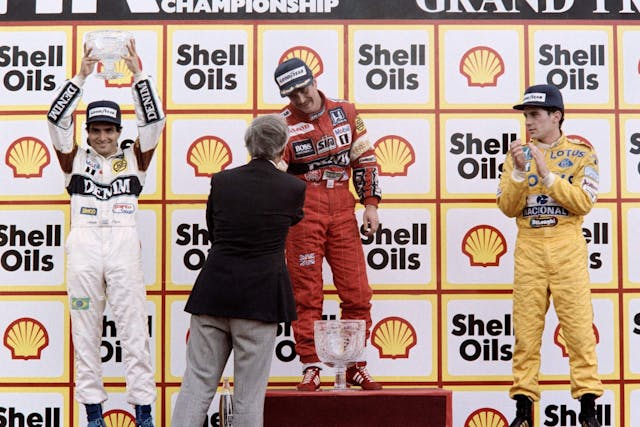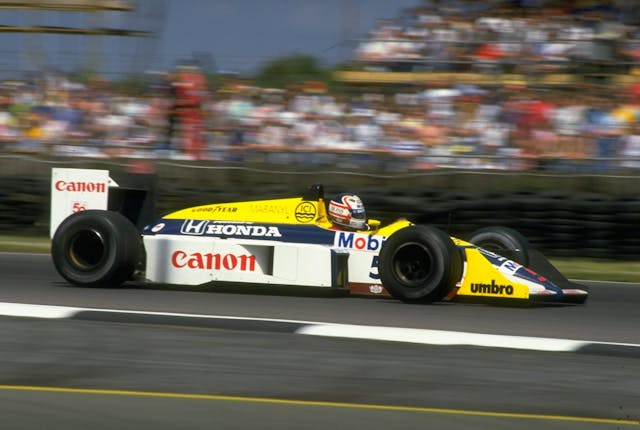Media | Articles
Masterclass: When Nigel Mansell destroyed Nelson Piquet at the 1987 British Grand Prix
Going into this weekend’s British Grand Prix, Lewis Hamilton holds more than double the number of Nigel Mansell’s home grand prix wins. But the Birmingham born driver, now 68, recorded arguably the most dramatic British Grand Prix win ever seen. Let’s go back 35 years and remember how Mansell destroyed Piquet – and settled a score.
With just over three laps of the 1987 British Grand Prix to go, Nigel Mansell looked at the fuel readout inside the cramped confines of his Williams-Honda. The tank was showing empty but there were still nearly nine miles around the Silverstone circuit to go. He refocused on the red and white helmeted head in the car in front.
Sitting between the moustachioed Briton and his third win of the season was his team-mate, Nelson Piquet. The pair had a famously prickly relationship. The Brazilian, a double world champion cheese to Mansell’s chalk, once called his British rival’s wife “ugly” in a magazine interview. [He has since done much worse, during an interview about the championship battle between Hamilton and Verstappen, last year. Ed.]
In his autobiography Mansell later wrote: “That was out of order. I think it says an awful lot about the sort of person he is.” Punchy. Part of the problem the pair had was the Williams-Honda was the fastest car on the track in 1986 and ’87. Only a tire failure at the final race had taken the ’86 crown from Mansell and given it to Alain Prost.
In ’87, Nigel knew his FW11B car was even more dominant. Like Piquet it hadn’t taken him long to realize that his teammate was all that stood between him and that year’s title. And at the previous grand prix in France, Mansell had out-driven, out-thought, and outmaneuvered the Brazilian.
Marketplace
Buy and sell classics with confidence
For his part, Piquet was determined to win his first race of 1987. Being in his rival’s backyard would make it all the sweeter.
The Brazilian’s efforts began well. He was quicker than Mansell for much of the weekend. That had culminated in pole position on Saturday which converted into the race lead 24 hours later.
Mansell had followed, staying a comfortable few seconds behind, the two Williams-Hondas leaving the other cars trailing. But Nigel’s home-win hopes hadn’t been helped when a wheel weight had flown off on lap 12. He’d maintained a steady gap to his team-mate but as his rubber wore, the vibrations began to affect the Briton’s vision.
On lap 35, Mansell blasted into the pits for new tires. The Williams mechanics changed all four wheels and sent Nigel on his way in 9.5 seconds, speedy for the time.
Such was the advantage enjoyed by the Williams-Honda that Mansell re-joined still in second place. But he was now 28 seconds behind Piquet with 29 laps remaining. Surely the best the British fans could hope for was to applaud their hero on the podium.
If many in the stands on that hot and sunny July day were thinking that, it hadn’t entered the mind of the man in the cockpit of Williams number 5. Mansell immediately started lapping quicker than he had done up to that point. Piquet responded and with 22 laps to go, he still had a handy 23 second lead. The race must be his now. Mustn’t it?
Again, no one had told Mansell, who was driving like a man possessed. His Williams-Honda was hitting every apex and exiting corners noticeably faster than anything else on the track. With 12 laps to go, the gap was down to 11.6 seconds.
At the same time, Piquet felt the life drain out of his tires. Manufacturer Goodyear had said they’d be good for a race distance. But they hadn’t banked on defending from a man whose tires had done half as many laps.
With 10 laps remaining, Mansell had the gap down to 7.6 seconds. He’d decided to run slightly less rear wing on his car than Piquet and this was about to prove decisive. With eight laps to go, Mansell put in the fastest lap of the race. The gap was down to 3.9 seconds and the excitement in the grandstands was reaching fever pitch.
Willed on by the increasing clamor of the 100,000-strong crowd, Nigel’s Williams closed up on the identical blue, white, and yellow car.
With three laps to go, he was 0.8 of a second behind Piquet. Nothing stood in the way of him and a famous victory now. Or did it? The fuel consumption read out for his Honda V6 turbo was now showing negative. “If it ran out of fuel, then so be it,” Mansell later said.
He put that to the back of his mind and soldiered on, tailing Piquet through Chapel Curve and onto the Hangar Straight. Sweating heavily in his red overalls Mansell’s focus remained laser-like.
Piquet covered the right of the track as the pair rushed up to Stowe corner so Mansell dummied left. The Brazilian responded enabling Mansell to fill the now-vacant space to his rival’s right and the corner was his. As they turned into Stowe, Piquet moved towards his team-mate, intimidating him at 190 mph.
They almost banged wheels. Almost. But nothing was going to deny Nigel that day. Or was it?
The crowd went wild to the point that Mansell could hear them from beneath his helmet. It did little to allay his fears as he reeled off the last couple of laps, knowing his engine was now sucking up the dregs in the fuel tank. Starting the last lap, the Honda hesitated agonizingly, but it kept going to the flag.

The superiority of the Williams cars and the ferocity of their battle had been such that Mansell and Piquet were a full lap ahead of the third-placed driver, a certain Ayrton Senna.
Two thirds of the way round the slowing down lap, Mansell’s Honda gave up for good, its final drops of Mobil race fuel exhausted. The stricken car was immediately engulfed by crowds of jubilant fans. A shell-shocked Piquet didn’t bother stopping to offer his nemesis a way out of the crush.
“When I crossed the line, the place erupted. Driving down the vast expanse of the Silverstone pit straight felt like walking into a small room on your birthday. I was overwhelmed by people power,” Mansell later recalled.
It was a mesmerizing drive and gave us a British Grand Prix that cemented the Brummie’s position as a full-on fans’ favorite.



